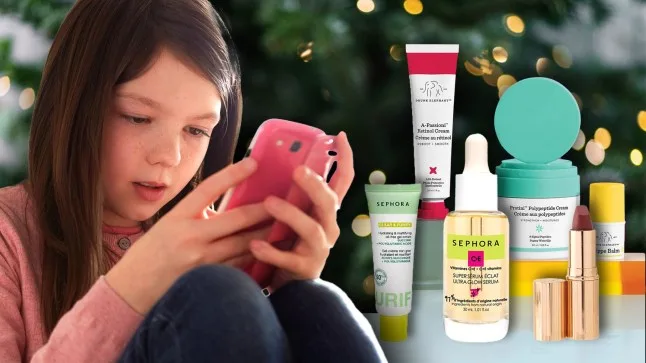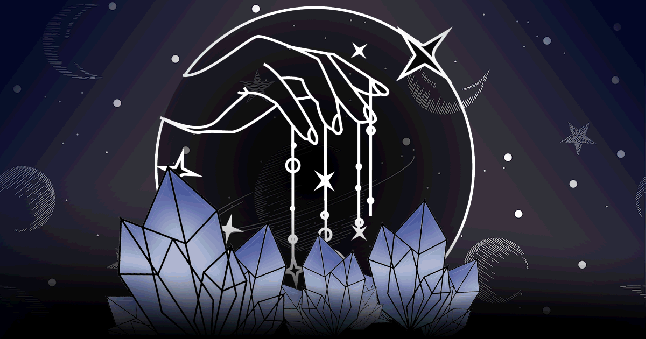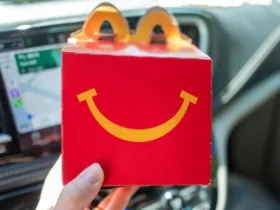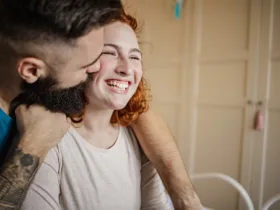
Clutching the Christmas list she’d been given, Jo Emerson scanned the requests: Charlotte Tilbury, Azio Beauty, MAC… Each a luxury beauty goodie and all with a healthy price tag.
Jo had been handed the lists from her three teenage daughters, who have been buying beauty products since they were 13. It was clear they were ambitious asks that went far beyond the girls’ everyday budgets – but it was Christmas, after all.
With December the ‘peak’ time for holiday shopping, gaggles of young girls have been busy crowding round the makeup counters at Sephora or Space NK and filling their online basket with Drunk Elephant and Rare Beauty, in a bid to build makeup hauls to rival their mothers’.
Jo tells Metro that her daughters’ routines already include a mix of moisturisers, primers, setting sprays, and other skincare staples. On average, they spend £30-50 a month on beauty products, with moisturisers and primers being the most expensive items.
‘One of my girls spent £20 on a setting spray recently, which I didn’t even know was a thing,’ says Jo. ‘Another paid £15 for a moisturiser, which, given they’re all on super-tight budgets, is unfathomable to me.’
While yesterday’s tweens and teens might have been happy with a dewberry gift set from The Body Shop in their stocking, times have definitely moved on. Today, many young girls — known online as ‘Sephora Tweens’ – are already experts in contouring, filling in brows or trying make up techniques popularised by the Kardashians, before they’ve hit 13.

The viral hashtag #sephoratweens has become a staple on TikTok, going hand in hand with clips of youngsters flooding stores such as Sephora and Ulta Beauty, desperate to get their hands on the last makeup must-have.
Unsurprisingly, it wasn’t long before the kids also began to gain infamy for being rude to staff and destroying testers.
Social media clips such as ‘feral 10 year old in sephora spotted in UK’ were followed with comments concerned about stores like Space NK being overrun with kids. ‘At 10 my mum would give me £5 in Claire’s,’one user said.
Meanwhile, in a TikTok video viewed over 300,000 times with the hashtag #sephorakidsneedtobestopped,mum @staarcosmic spoke out about the toxicity of beauty influencer’s impact on children. She explained that she felt she had ‘failed’ her daughter, allowing her to view content online and not recognising the impact of beauty content on the nine-year-old.
As we approach Christmas, retail insiders have also noticed a rise in demand.

‘What started out as a niche and quite radical sounding trend has become more and more a reality in the retail landscape – it’s very clear that the data shows tweens are big business,’ explains brand expert Rachel Humphrey.
‘Luxury brands are seeing a huge shift in young shoppers and parents purchasing for them plus tween focused premium brands are booming. Bubble just recently announced 900% increase in sales from 2022 to 2023.
Rachel, who is founder and director of Brand Building Co and a mum to Penelope, 8, adds that some brands naturally attract a younger audience due to the ‘fun, playful nature’ of their branding.

‘However, it seems that product development is leaning towards tweens more with the introduction of light fragrances, clear lipgloss ranges and other wearable products that naturally appeal to a younger audience and are more likely for a parent to agree to purchase,’ she explains. ‘It’s interesting because the price points are high. So they are sitting alongside tech and other large purchase pieces on the Christmas lists, almost as ‘main’ presents because they are premium purchases.’
By day, Jo Emerson works as an international executive coach, helping leaders and teams on building confidence so that they can perform at their best. It’s no surprise that the same principles trickle down in conversations with her children.
While instilling self-belief and high self-esteem in her girls is crucial, she worries about external factors – namely young people’s preoccupation with the beauty genre on social media.

One of the most popular communities globally on platforms like TikTok, YouTube and Instagram and in 2022 alone, Forbes estimated that the beauty hashtag dominated Instagram with over 490 million entries. In the past two years, this number has now reached a massive 1.1 billion posts.
‘I am really frustrated because my generation has worked so hard to break the objectification of women and girls, and yet here are my daughters all worrying about how they look.
‘Back in the 1980s all my skin saw was a bar of soap and a dab of Nivea if I could be bothered,’ she explains, admitting she is perplexed at the amount of time and money her daughters spend on products, deeming them ‘extreme.’
‘They likely have more elaborate routines than I do,’ she adds.
A common frustration for her at family gatherings is when she will take a group photo. Before Jo can post it online, her daughters insist on checking the photo and deliberate over whether it’s ‘postable’ or not.

If anything, she is relieved that her girls are happy to go bare-faced when with their close friends and family. ‘ It’s online or at school that they feel most judged. I’ve also always drummed into them that ‘less is more’ when it comes to make up so they don’t pile it on.’
Even so, Jo admits it’s hard for her daughters to seperate truth from fiction.
‘It’s almost like they’ve seen what ‘perfect skin’ looks like online (via a filter) and that’s the standard they have in their minds,’ she says. ‘If these messages become more dominant we’re going to have an epidemic of facial dysmorphia whereby young people feel see imperfections that aren’t there.’
Jo’s concerns aren’t unfounded. Numerous studies highlight the impact of social media on young girls’ self-esteem and body image issues.
The Girlguiding Girls’ Attitudes Survey (July 2024) revealed that many in the UK find negative thoughts about their appearance overwhelming, with over half reporting that these thoughts harm their confidence.
While in August, Dove launched its latest research study, The Real State of Beauty: A Global Report, which surveyed young people aged 10–17 across 20 countries on their self-esteem and confidence. Their findings revealed that 8 in 10 women and girls say they have been exposed to harmful beauty content on social media.

In response, TikTok say they’ve been actively seeking to encourage a healthier screen time balance with young users. For instance, accounts for users aged 13-17 are automatically set to a 60-minute daily screen time limit. If teens choose to opt out of this limit, they receive prompts to set their own limits if they spend more than 100 minutes on the app.
Jo is also concerned about her daughters fixating on issues like ageing, even when they aren’t necessary. ‘I worry that they might feel pressured to buy more and more products, and I really don’t want them using acids, fillers, or Botox at such a young age.’
Professional bodies like the British Association of Dermatologists echo the her concerns. They warn that strong active ingredients in adult skincare can cause irreversible damage on younger skin.
Hope Flynn, is a relationship expert and founder of online community, So What?, where followers share what’s on their minds. Even in her mid-twenties, Hope admits she is easily influenced and can’t resist the urge to buy a new product or two.

‘I feel like I have to have all these fancy overpriced products to fit in or look a certain way – so I can’t even begin to imagine the impact it is having on young impressionable girls,’ she tells Metro.
She’s also acutely aware of the challenges parents face to avoid their children getting swept up in this social media frenzy.
Hope explains: ‘When I asked my community the other day ‘Why do you work?’ one follower replied, ‘I work so my kids can spend my money on skincare products like Drunk Elephant’ which just highlighted too me that not only is this obsession with skincare becoming damaging to children’s self-esteem but it’s also burning a big hole in parents pockets.’
However, not everyone is so worried.
Anaisandellen are a mother-daughter beauty duo on TikTok. Claire, in her forties, and her 12-year-old daughter Anais, share product reviews and makeup clips featuring brands like Fenty and Rare Beauty. Together they’ve built a growing following of over 4,000 followers and have 30.8k likes.

Unlike Jo and Hope, Claire is upbeat and feels positively about her daughter Anais using skincare and makeup products. For the two, it’s spending quality time together on what they love – beauty.
‘We enjoy creating content and reviewing new products which we continue to use after making videos,’ she explains.
Does she worry her daughter will be consumed by her appearance at such a young age? No, says Claire. ‘If I’m healthy and positive about my image and my mentality around it, the message will filter down to my daughter.’
After all, she firmly believes that it’s about giving her daughter the right information on beauty while helping her navigate it safely.
‘Education on anything is never wasted. it’s better to get ahead of the industry and media hype to learn about the products and guide our daughters through the process of using skincare and makeup in a valuable and positive way,’ she explains.

Social media has so far been a positive force in empowering her daughter. As Anais is of mixed heritage with curly hair and a different complexion to her mother, she has struggled to feel represented.
But thanks to apps like TikTok she now sees people who look like her and finds products that work for her unique skin and hair.
So far, expensive products like £22 Rare Beauty liquid blushes haven’t been a barrier. For Claire it’s about prioritising where her money goes. ‘I set myself a monthly budget and we work with that. We just chose to buy a new moisturiser instead of a takeaway.’
Dr Sophie Shotter support this balanced approach. She believes that experimenting with beauty is a natural part of growing up but should be done mindfully and with good guidance.
As an award-winning aesthetic doctor on Harley Street, Dr Shotter works to enhance her patients natural beauty so they can look their best. For her, beauty isn’t a taboo.
‘It’s normal that many girls become interested in beauty and will choose to engage with content. I was 12 when my dad first took me to a make up counter to learn how to do make up for myself,’ she recalls.
While skincare routines ought to be tailored to each individual, she agrees with Claire that learning about beauty and skin health can be empowering at a young age.

However,Dr Shotter cautions against taking product reviews at face value. ‘These reviews can be hugely influential on girls, especially if they are posted by an influencer who they admire.’
She explains: ‘They may not always be suitable for that girl – every skin is different, and many influencers are a few years older than the girl watching the video.
‘Over complicated routines, and lots of active ingredients just aren’t needed at this age.’
Dr Shotter says that getting tweens and teens to use a simple cleanser, moisturiser and sunscreen is a good habit to form ‘before their hormones go crazy and can help prevent or minimise teenage skin problems’.
‘Ultimately, It’s never too young to learn about skin health,’ she adds. ‘Healthy skin lies at the crux of everything to do with beauty and also to do with health – healthy skin contributes to a healthy body.
‘But, as with all things, moderation is key.’







